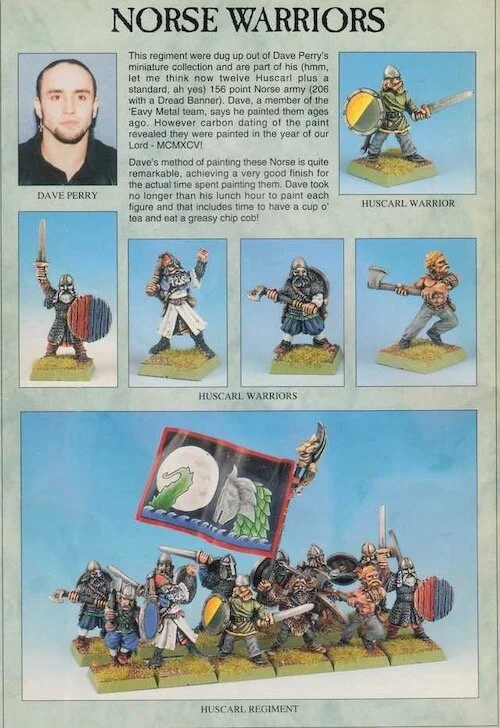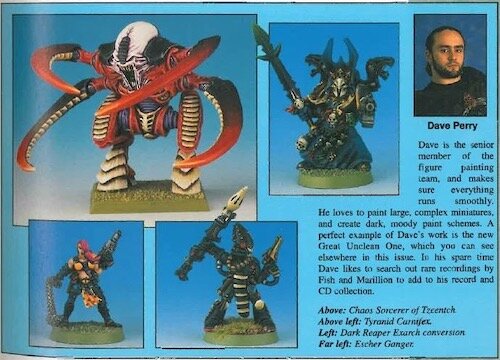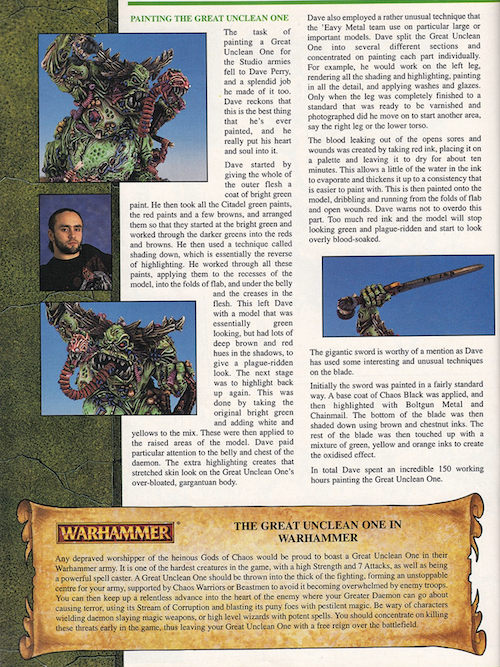Once upon a time…
Much as his adopted homeland of Japan suffered a so-called “lost decade” of economic stagnation through the 1990s, Dave Perry also endured a similarly self-inflicted lost decade of ruinous misadventure resulting in his own economic, intellectual and moral decline.
The underlying cause of this misspent youth was a “career” in the world of toy soldiers and miniature wargaming beginning at Games Workshop in the early 1990s and ending in the freelance wilderness by the early-2000s. The origins of the malady, that being his one time passion for science-fiction and fantasy miniatures, began in the mid-1980s with an interest in Fighting Fantasy adventure books, an initial reading of Tolkien’s The Lord of the Rings and his introduction to the wonders of two inch high metal miniatures by a contemporary at a middle school play-day.
Dave’s first miniatures were a pack of Half-Orcs designed by Ali Morrison and a Orc command group by Kev Adams. There followed halcyon days of discovery during the “golden age” of Games Workshop. Warhammer Fantasy Battle 3rd Edition reigned supreme; boxed games such as Adeptus Titanicus, Blood Bowl and Dark Future provided easy access to what is these days called “The Hobby;” miniatures had yet to be painted in red, red, and more red, and Games Workshop stores were not yet vying for ubiquity with Starbucks; reading the Realm of Chaos books felt like practicing Satanism and it was still cool to listen to heavy metal and wear your hair like a girl.
There was no turning back. Initially interested only in collecting Lord of the Rings and seemingly related fantasy miniatures Dave soon succumbed to the temptations of Space Marines and Warhammer 40,000. As much as gaming was enjoyable, it was collecting and painting the miniatures themselves that was of primary interest. From his early travesties of paint and brush Dave slowly reached the point at which he could keep the paint “in the lines,” although his favourite skin tone was Sunburst Yellow, if he bothered to paint the flesh areas at all...
Dave’s painting epiphany came in the form a step-by-step guide in White Dwarf magazine in which Mike McVey demonstrated how to paint a Blood Angel Terminator Captain. Following the instructions to the letter Dave produced what to his young eyes seemed a fair approximation of the original. Determined to one day be a “pro” and be hired by Games Workshop as a member of the ‘Eavy Metal team his free time was consumed by painting and pouring over the pages of painted miniatures in White Dwarf in order develop the skills and knowledge necessary to attaining his “dream.” Even when his gaming pursuits at the local wargames club were eclipsed by a growing interest in girls, beer and wearing black he never stopped painting.
Eventually, and after a failed first application and continued support and encouragement from Richard Gunson and Stuart Willis, Dave was summoned to Games Workshop’s Design Studio in Nottingham, England, for an audience with then studio manager Alan Merret. Alan, despite misgivings that would eventually prove to be remarkably accurate, offered Dave a job. Dave, despite Mike McVey’s warning that “you don’t want to do this, you should stay at college,” readily accepted the offer. The rest, as they say, is history.
Citadel Jounal, circa 1994
Games Workshop was at the time transitioning to a more mainstream, commercially successful business model and the “Disnification” of its core imagery proceeded apace. Despite the best attempts of Dave and a handful of other like minded Design Studio staff to cling to the “darker,” “grittier” past, the reality was that they were the relics.
Looking back it was a lot of fun. Although at the time it seemed a purgatory of subsistence level living, bullying and boredom. The office politics, in particular the regular purges that took place, would have made even the Communist Party of China’s politburo blanch. On the up side, Dave enjoyed the opportunity to work with many whom he had long admired. They also drank a lot of beer.
White Dwarf, circa 1997/8
Dave did very little real “work” and spent most of his days, over a period of about five years, clowning around and annoying his managers and colleagues, as well as engaging in biscuit eating contests. (His record was an entire packet of Hob Nobs in 19.5 seconds, tea-assisted of course.) Dave’s greatest single achievement, apart from the Hob Nobs, was managing over the course of a month or so to read The Silmarillion in its entirety and three-quarters of The Lord of the Rings, under his desk when he should have been working. Needless to say, his duplicity was eventually discovered and his literary pursuits outlawed. Oh, and he painted a few miniatures too.
Never truly great, Dave’s painting was, I suppose, sufficient. He had a few inspired moments from which came a handful of noteworthy pieces at best. He was certainly not the best, as amply demonstrated by many of his contemporaries, although Dave did play some small part in the rearing of other talent. No, his claim to fame (apart from taking five weeks to paint one Greater Daemon of Nurgle) was that, along with a few others such as Paul Muller, Stuart Thomas and Mark Jones, he was a guardian of the old lore, protector of tradition and resistance fighter. Or at least that’s what he liked to think.
White Dwarf, circa 1997/8
In the face of the seemingly insurmountable wall of Go Fasta Red, Goblin Green bases and a ban on black undercoats, Dave maintained, and sought to demonstrate, that it was safe to use brown paint, static grass on bases did look cool, black undercoats produce better finished results, and that more realistic colour schemes did not equate to commercial suicide. Denounced as a traitor and accused of “heresy” (really, such words were (are?) very much part of the lexicon of GW life), he persisted.
In the end the forces of good prevailed, and as such bright red ghosts and goblins with yellow spears are now a thing of the long forgotten past. But so too is Dave’s painting and any claims to being an “authority” on the subject that he might once have had.
Eventually, having successfully clambered to the top of the ‘Eavy Metal Team’s greasy pole, he then made an ill-considered, futile and ultimately disastrous foray into a new career as a miniature designer. Why? They got paid more. Why disastrous? Because he was crap at it and his mind was given over to Wertherism.
When Games Workshop finally came to its senses and gave Dave the boot, he parachuted into Harlequin Miniatures where he made some truly awful miniatures, had the pleasure of working alongside artist Tony Ackland (how old skool can you get?) and overindulged at weekends. When his time there finished, Dave sojourned in Edinburgh where he joined Target Games, just three months before its collapse, and made a few more mediocre miniatures for the Warzone and Chronopia ranges while having the chance to work alongside some more childhood heroes such as Adrian Smith and Roy Eastland.
From then on he did bits and pieces of freelance painting and sculpting of which none were of any consequence, although Hamleys of London still stocks his little pewter teddy-bears dressed as policeman and Beefeaters.
Although Dave continued to do odd bits of commission work over the following years he now rarely paints.
UPDATE: As of 2020, and thanks largely to the appeal of games such as Saga, Dave is taking his tentative first steps back into miniature painting and gaming.



